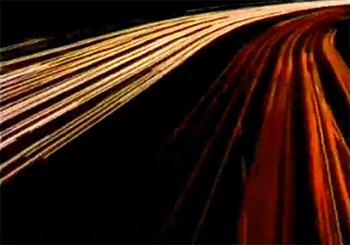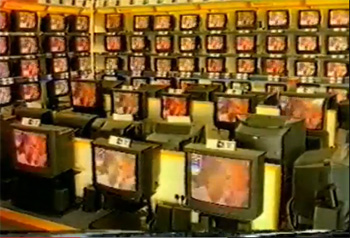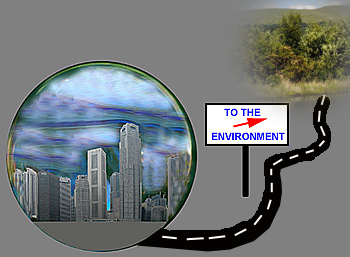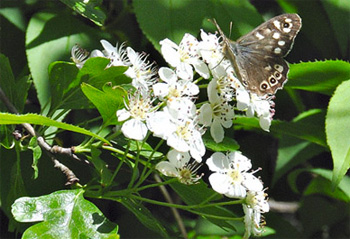
'I grieved to think how brief the dream of the human intellect had been. It had committed suicide. It had set itself steadfastly towards comfort and ease, a balanced society with security and permanency as its watchword, it had attained its hopes - to come to this at last...'
'...It is a law of nature we overlook, that intellectual versatility is the compensation for change, danger, and trouble. An animal perfectly in harmony with its environment is a perfect mechanism. Nature never appeals to intelligence until habit and instinct are useless. There is no intelligence where there is no change and no need of change. Only those animals partake of intelligence that have to meet a huge variety of needs and dangers.'
from The Time Machine by H.G. Wells (1895)
Connectivity. We utterly rely on it. Without connectivity, our civilisation ceases to exist. That's a big statement to make, but I will argue below how, over the past fifty years, many of us have lost the full understanding of its importance, or in many cases have not developed such an understanding. In a destabilising climate, that detachment becomes all the more problematic.
Some connections we still manage to make with ease. We know that if there is a power-cut, things that run on mains electricity will, in the absence of a generator, not work. We know that if there is a heavy snowstorm then the roads will be paralysed. We fully understand that, if the systems we have devised go down, then disruption to our day-to-day lives will ensue until the problems are fixed, the power reconnected and the snow thaws. We see and feel the connectivity of these systems and plan for them accordingly - candles in the cupboard, a shovel in the car boot during the winter months, and so on.

above: like a human tide... lights on the highway
But what else? What other connectivity do we see? We move as a human tide to and from our places of work or education, daily in and out, flood and ebb. We complete our tasks in return for numbers that are fed to our individual databases: these numbers may then be fed to the databases of larger organisations in return for stuff that we need or want, depending on the numbers available. We need nutrition so we obtain a certain amount of that on a regular basis, a proportion of which is eaten and another proportion of which is kept for a time then taken away to be buried in the ground. We want things so much that we believe that we need them: not tools for some trade or other but gadgets and widgets, to ostentatiously display to others but soon to become out-of-date, passe, to be superseded by later models and put in some hidden place and forgotten about. Some time ago a change in terminology occurred. We were no longer Humans: we became Consumers, processors of stuff. We are still reminded of this change in nomenclature, this reclassification, daily and hourly. In this semi-robotic mode of existence, bombarded with messages that encourage us to consume ever more stuff, we have become part-disconnected from the world out there. How much do we really know of that world and how much do we need to know, and why does that matter?

above: bombarded with messages aimed to persuade us to consume more and more...
I live in a small market town amongst the rolling hills of Wales, a country somewhat advantageously situated in the NW of NW Europe, meaning that we stick out into the Atlantic a bit and receive plenty of rain. This is a distinct advantage with agriculture being one of the economic mainstays of the area. But even in a place whose strong link to the land goes back to its founding as a settlement, one sees examples of the Great Disconnect. A few years ago I helped a local group planting fruit trees at a local housing estate. The group got the local school involved and the kids came to help. One lad, in all seriousness, told me he didn't realise that trees were where apples came from. He thought they came from the supermarket. He was quite amazed. A year or two before, fishing on a nearby beach one evening, I was reeling in a dogfish (common at times on our coast) and as it emerged writhing from the surf a passing woman started pointing and wailing "uuugghhh! It's alive! It's alive!" And of course there was that widely-reported complaint to a travel agent a few years back: "No-one told us there would be fish in the sea. The children were startled."
Most people will find humour in such things - especially the latter complaint - but beneath them there lies a more serious problem: a lot of people understand neither the environment nor its vital importance to our continued wellbeing. In the disconnected world, food really does come from the supermarket - in many cases, for the sake of convenience or marketing, processed and packaged beyond recognition. That connectivity between it and the environment is broken, severed. Know about the latest antics of our sports or entertainment celebrities? Sure. Know about the vital minerals required for good quality vegetables to grow? Nope - why should I? The very relevant cast aside in favour of the utterly irrelevant..
The corporate world, of course, finds it easier to function with a disconnected populace, which is why it has promoted and continues to promote such disconnection. The more disconnected people become, the less awkward questions they are likely to ask. Indeed, the less questions full stop. Climate change denial is just one symptom of the greater malaise here: as long as people think all the environment represents is some place you go on vacation, in corporate eyes everything is fine. It is to their advantage to have people who think that the environment is quite irrelevant and that all environmentalists are nutters. They exist to make as much money as possible from you - the people - and that's a whole lot easier if people stop asking questions and stick to watching the football or the soaps, replete with those essential advertisements.

above: how some seem to regard the environment..
This was not always so. One only has to go back forty years here in the UK to reach a point where it was normal for most people to grow their own vegetables: the high streets of our towns were dotted with small, independent traders selling quality, nonprocessed foodstuffs. Much food, especially fruit and veg, was seasonal and there were always things to look forward to depending on the time of year, provided the weather played ball. Thus, we grew up well aware of the connections between seasons, weather and food. Perhaps I could be accused of hankering for the past, of wanting to turn the clock back. Guilty. I miss such times: today I see in their place crowded supermarket aisles full of stressed-looking people trying to make sense of the ridiculous amount of 'choice' on offer. I see small packets of 'fresh' green beans in the depths of winter that have individually done more air-miles during their brief existence than I have done in my lifetime. Boxes of attractively-packaged gloop crammed with salt and additives, their identification often prefixed with 'farmhouse' (surely the correct spelling is 'factory'?). Yes, I want to turn the clock back. Not to living in a cave garbed in stout hessian, I hastily add, but back to a time when communities and small independent traders thrived and everything was less energy-intensive and, well, manic, headlong, polluting and, yes, less disconnected.
There are bits of today I would hang onto and bits of yesteryear I would ditch. Advances in communications and medicine would be in; pollution 1950s-style would be out. But pollution, 2010s style, would also be out. 'What you cannot see cannot harm you' is one of the most dangerous sayings out there. You cannot see hydrogen sulphide gas, but at concentrations of a few hundred ppm (at which level you cannot smell it either) it can be deadly poisonous. We have replaced the choking smogs of the 1950s with an insidious and slowly accumulating pollutant, carbon dioxide. It is invisible, but its effects are becoming ever more plain to see as trapped energy continues to build up in our oceans and atmosphere. And there will come a point where - if nothing is done about it - we will all be reconnected rather abruptly, be it via violent storms, sea level rise or food shortages and spiralling costs.

above: everything out there is interconnected: feeding insects pollinate flowering plants, for example - a vital connection in plant reproduction...
To my mind, we have two options regarding the Great Disconnect. We can a) make the reconnection ourselves at a relatively gentle pace over the coming years - this is the stuff the Transition Movement is all about - or b) we can carry on with this manic, headlong, polluting and disconnected state of living until it is done for us in a much less subtle manner as physical processes start to pull the plugs. We can either work with the environment or against it, but whilst pondering the choice to make, remember that the absolute bottom line is that if the environment dies, it takes Mankind with it. A healthy environment provides us with breathable air, drinkable water and all our food: the supermarket is merely one of several middlemen. We need to be connected to it. With that in mind, of the two options, I rather like Plan A. I'm doing my best to implement it in my own life, and perhaps not surprisingly, life feels a lot less stressful. One of the most powerful antidotes to stress is reconnection with Nature: this is often stated and I can confirm it from personal experience. But if we all adopted it, what would you keep and what would you leave behind?
Posted by John Mason on Thursday, 7 February, 2013
 |
The Skeptical Science website by Skeptical Science is licensed under a Creative Commons Attribution 3.0 Unported License. |